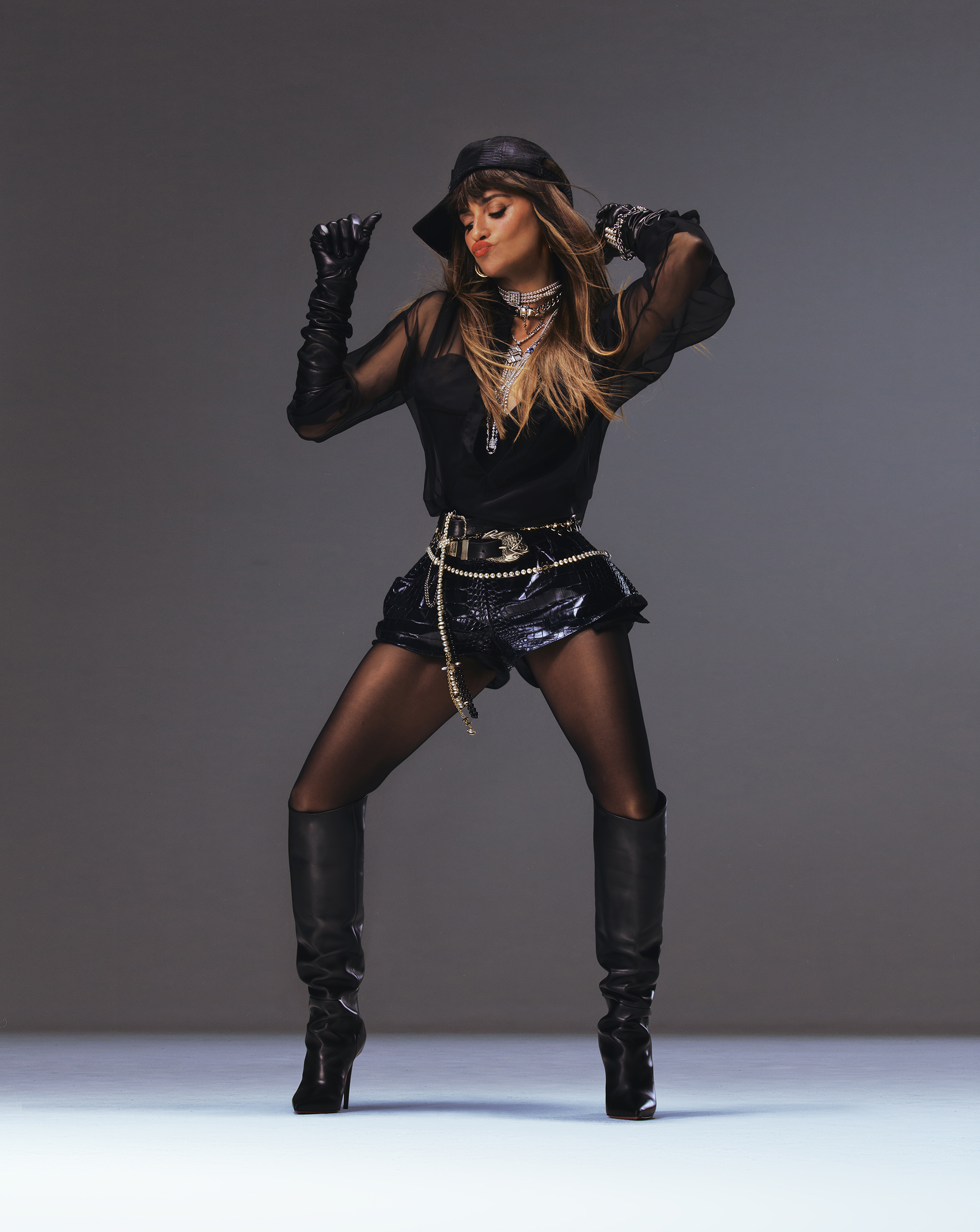Something I regret not telling international icon and Academy Award-winning actor Penelope Cruz while moderating her V cover interview with fellow A-lister Dua Lipa is that a little piece of Maria Elena, the deranged, riveting artistic genius Cruz plays in 2008’s Vicky Cristina Barcelona, lives in all Spanish-speaking women. As you may remember, Maria Elena tries and fails twice to kill her ex-husband Juan Antonio (played by Cruz’s real-life husband Javier Bardem) once with a knife and once with a gun; she sleeps with his lover Cristina (Scarlett Johansson); and regularly touts her intellectual superiority over the two while they each find in her a creative muse for the summer.
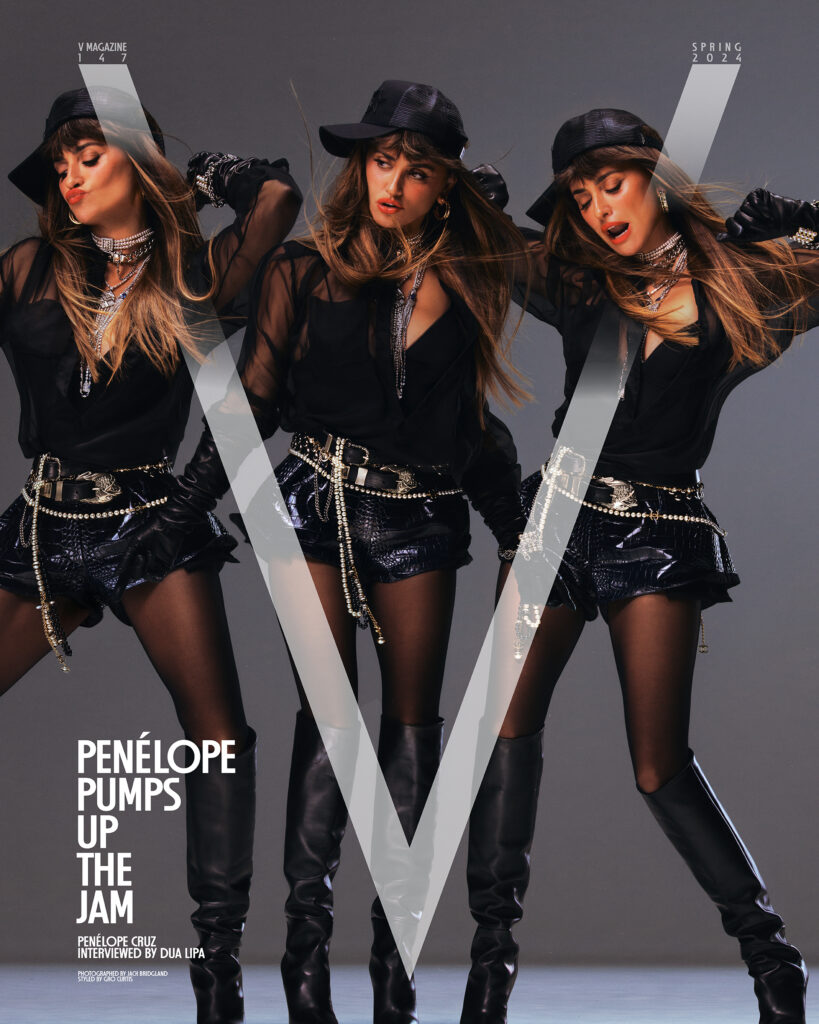
Cruz’s portrayal of Maria Elena is passionate, hypnotizing, and filled with rage. She taps into the fire a lot of women, Spanish-speaking or not, possess but don’t know they can fully inhabit, perhaps, until they witness her doing it so uninhibitedly. It is no secret that the soon-to-be 50-year-old can deliver a layered and thought-provoking interpretation of a character that could have otherwise been reduced to a “difficult woman,” Cruz sees film as a medium meant to spark debate. When she read the script for Michael Mann’s Ferrari, she saw an opportunity to platform the intellect, grief, and unrecognized achievements of a woman who actually existed, Laura Ferrari. In her conversation with Dua Lipa—whose Spanish is impressively accent-less—Cruz unpacks her predilection for these complex roles and what drew her to the part of Laura, how her witchy ways manifested her famous, decades-long relationship with Spanish director Pedro Almodovar, and why she left Dua’s 2023 Met Gala rave early. Spoiler alert: It was because she was sleepy.
She’s just like us, for real.
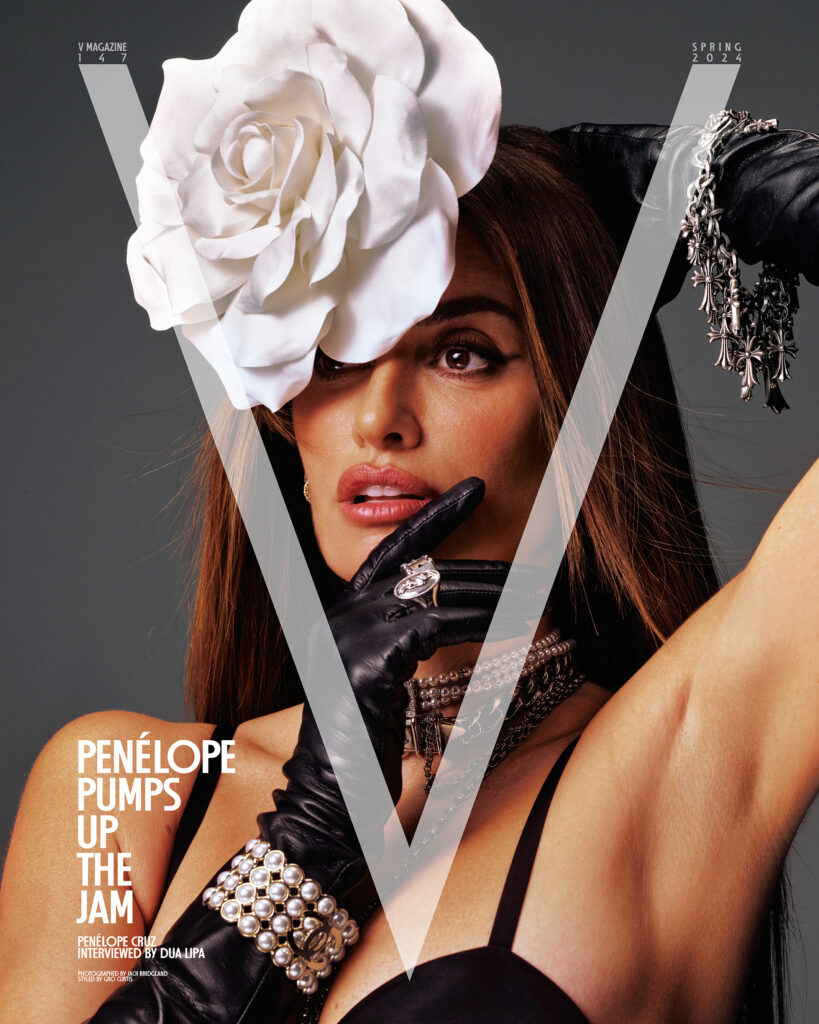
PENELOPE CRUZ: I love your red hair.
DUA LIPA: I think it’s a little crazy right now, I kind of just woke up and tied it up.
PC: Thank you so much for doing this, Dua. I know how busy you are.
DL: Oh, no, thank you. I’m so happy to do this. I’m just such a fan of you as a person, but also of everything that you’ve done.
PC: That’s how I feel about you. You’re one of the kindest people that I know. Those two days that we spent together [at the Met Gala in 2023], I got addicted to you and I’ve been missing you so much.
DL: I miss you too. I need to come to Madrid and see you. I know that you’ve been on the craziest promo run, I feel like you’re always on a promo run. It’s like you’re doing a movie and then you’re on the red carpet and you’re looking glamorous and then you’re in a photoshoot. It’s just like, one thing after the other and I feel like all the works that you’re producing are just amazing.
PC: Thank you. I don’t feel like that because I only make like one movie per year or maybe every two years. I feel like lately because of COVID and then the strike, everything got pushed together. I’ve been lucky with the results of those projects, but I don’t work a lot. Not as much as before I had kids. But thank you for what you said. That’s how I feel about you. I don’t know how you do it. Always that energy. And you give so much and your talent is out of this world. I wish I had your energy.
DL: Oh my gosh. I was reading that you, I guess prior to having kids, made four movies a year.
PC: Yes.
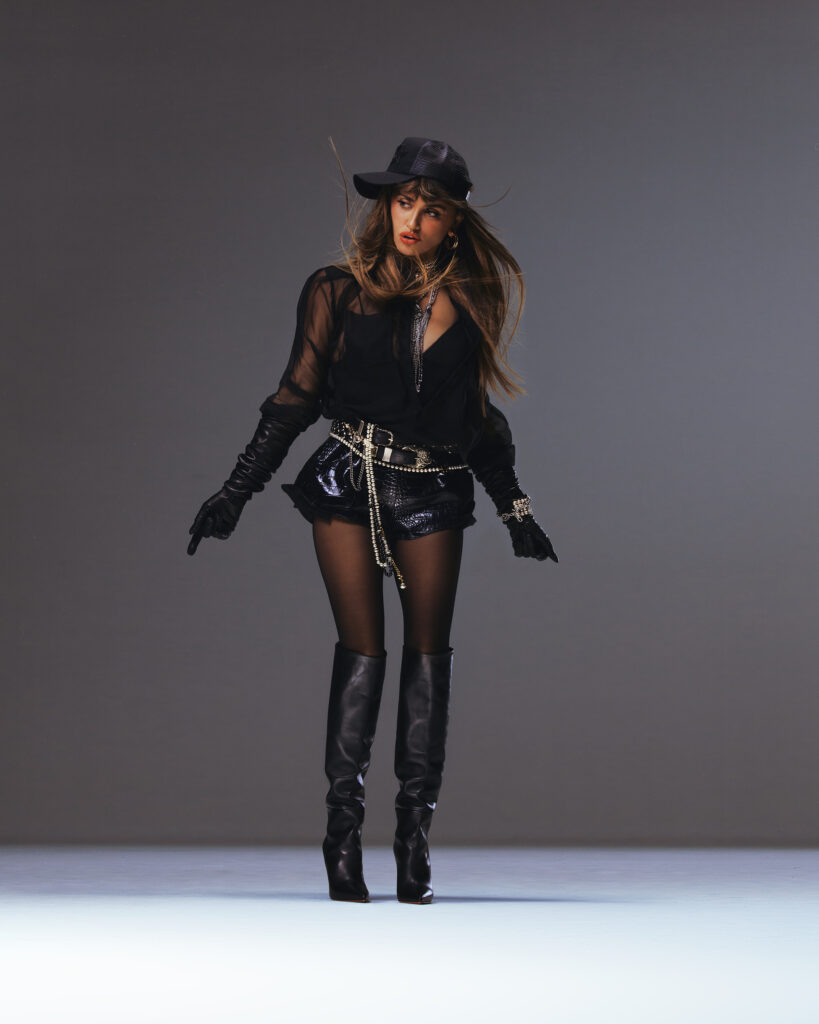
DL: In Madrid and in LA, like non-stop. When you’re passionate about something, it’s like a hamster wheel. I love that you’ve found balance and something that works for you—and I want to get more into that—but first, I want to talk about just cinema overall. I feel like 2023 has been such a big year for movies. What are your thoughts on some of the movies that have come out in 2023?
PC: In a way, we’re still recovering from COVID—our industry and every single industry in the world, it has affected everything. I feel that so many projects fell apart, and they will never be made. Between that and the strike that also created so much suffering, so many people in our industry that maybe don’t have the most privileged positions lost so much. It was really really hard for so many people, but, after all these things, having a year with so many great films is so encouraging for the industry and for everyone involved. I feel so lucky and so privileged to be a part of that and to be working. When I was a little girl and I was praying to be able to do this job, ‘Just let me do it. Please God, let me do this enough so [that] I can make a living out of it.’ Everything else that is happening is like an extra that I never asked for. I could not afford to dream about that. This is a very special year that makes me feel even more grateful.
DL: That’s beautiful. Tell me a little bit about… I know that you’re a little bit of a witch, and manifest things.
PC: Oh! [Laughs.] Who told you that?
DL: I feel like even when you were younger, and you wanted to work with a mutual friend of ours, Pedro [Almodovar], for example, I read that you just dreamt about it, you thought about it all the time, you visualized him in different places. Tell me about that.
PC: Can I ask who was that person that told you that I was a little bit of a witch?
DL: It was Pedro.
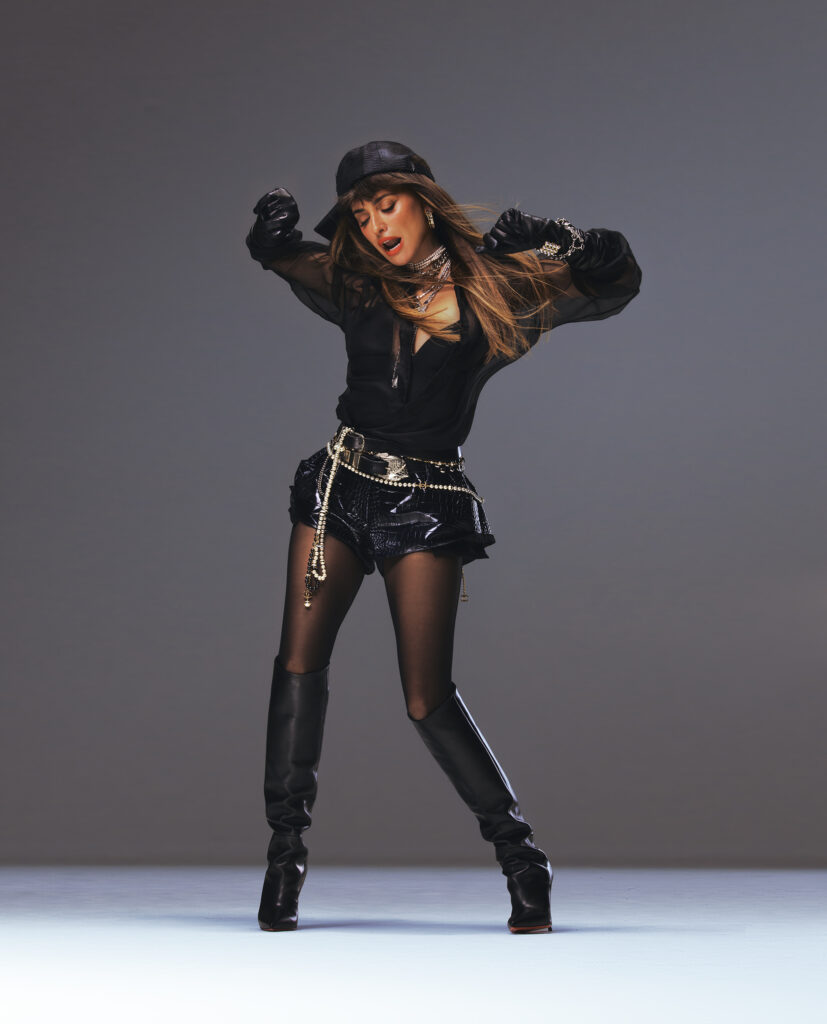
PC: It was Pedro. Okay. When I met him, I was 17 or 18, and he didn’t cast me because I was too young for that role. But he told me, ‘I will write a character for you for another movie.’ And then he did. But when I met him, I told him, ‘Pedro, I used to think about you and have this feeling that I was going to see you. Go to your neighborhood and see you or go to a cinema in the center of Madrid—he didn’t live near there and me neither—and at the end of the movie, I will go out and [you] would be there.’ At the beginning, I know he didn’t believe me. He thought, Oh, my God, this is adorable and so young! When he saw that things started to happen between him and —[we had] like this huge connection. And I really believe in that. I don’t mind if somebody laughs at me when I say that because it has happened all my life.
DL: Me too, me too.
PC: I imagine that you and I have a connection like that. But I know a lot of people only believe what they can see and touch. And that’s okay. I don’t judge that, but that’s not my case. When I was dreaming about working with Pedro, it was like saying to my parents, like, ‘I want to be an astronaut.’ It was almost impossible. But the fact that they didn’t laugh at me and they allowed me to try and dream big. Dream big like: I’d like to work in different languages, different countries, but my main dream was to meet this man. ‘I want to meet Almodovar. I want to be his friend because I know that we have something in common and I want him in my life.’ It was not just about working with him. It was everything. He is one of the most important people in my life. But it’s true that a lot of strange, magical things have happened between him and I from day one. I love that. For me, that was one of the most special things in life.
DL: I mean, I believe that and I believe in manifestation. I think it’s so important to put your ideas out into the world. You have to say them even if they’re scary. I think your dreams have to scare you sometimes, because it’s the only way that you’ll be like, ‘I’m just gonna try.’ It’s the same for me with music. It seemed like something that would never happen to me, but I was like, ‘I’m hoping that if I dream hard enough or envision myself on the stage, or I imagine myself performing or getting up and doing that—I just hope it happens.’
PC: In my career, that has been like the biggest engine, because I didn’t [know] people who could make a living out of something related to the arts in general. I didn’t know anybody. Also, my parents didn’t know anybody. It was like, it was too big of a dream. The fact that I’m making a living out of this has to do so much—apart from being grateful for all the people that have given me opportunities—with putting it out there. And dreaming about the dream. Creating it by dreaming it.
DL: I want to talk to you about Ferrari obviously, because that’s your next big thing. Something that, from what I can tell, you’re also very passionate about. The thing that I love [about you] is the way that you embody female characters, the authenticity that you bring to [them] is really powerful. You want to dive into the complexities of life and I feel like you have a very non-judgmental approach towards the women that you portray.
PC: That’s the biggest compliment that you can give me.
DL: You find a lot of grace with all their life stories—at least, that’s what I see as a person from the outside looking in—and I just want to know, what was the process like for you embodying the role of Laura Ferrari?
PC: [Laura] was a real character, but not a lot of people knew about her. Everyone knew about Enzo, he was a very idealized, iconic figure. If you walk around Modena, [Italy,] he’s untouchable. But when I did my research, in Modena with Michael [Mann, Ferrari’s director], we discovered that people didn’t want to talk about this woman. They prefer to keep her in the shadows like she was all her life. I realized that she actually did a lot for the company. She was not crazy like people would tell me in the street, she was deeply depressed because she had lost her son and, also, her husband went to create another family and had another son with somebody else. Everyone where they lived knew except for her. So she was broken.
One of her only motivations to stay alive was the connection with the company. She felt it was also her own because she was one of the first investors. If you do the research, it’s true that she sold a very special object and put [that] money into the company. Enzo knew that and that’s why he always gave her a place that was very criticized by all the other men—I mean, she could have had a much better place. She was the one controlling the finances and she was very smart and meticulous and obsessed with detail like [Enzo] was. But it was one more case of a woman living in the shadow of men and that being approved and supported by all of society. I felt like a feel for revenge. Looking around and seeing that there are so many women around the world living very similar situations, I think for Michael and I, it became like a personal necessity to give this woman a voice because she represents so many others today.
DL: Even though you touched on it a little bit, your character goes through grief, infidelity, and financial hardships—were those some of the main things that attracted you to the role? How did it come about for you to get involved in this project?
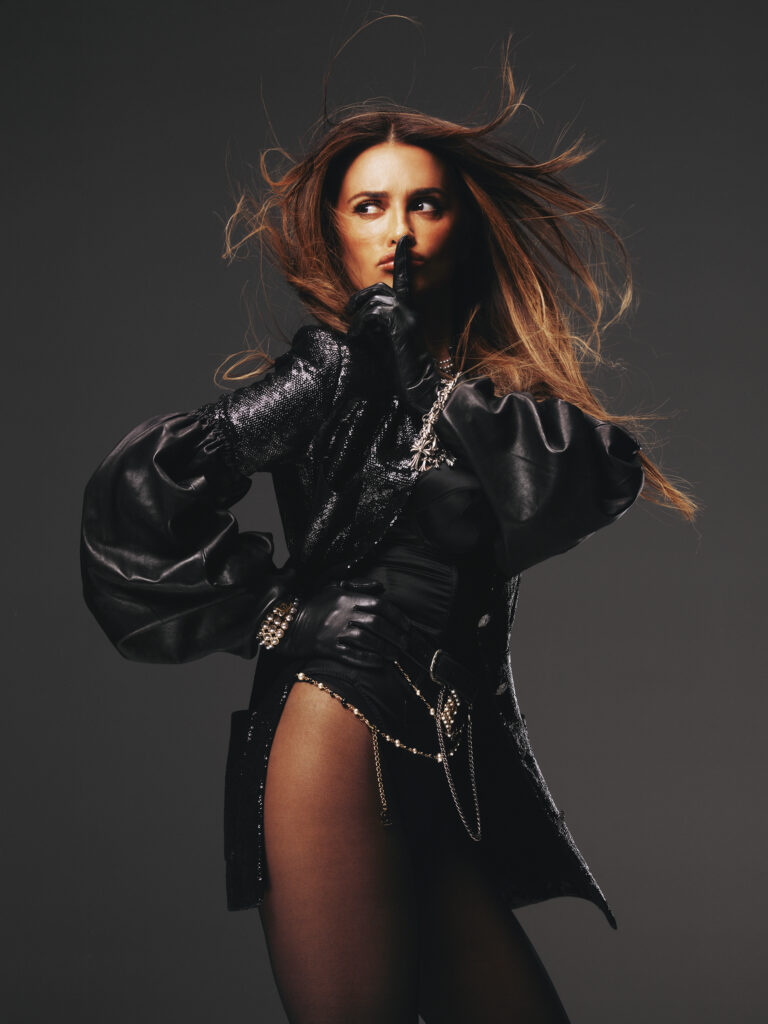
PC: Apart from the fact that it was so attractive to me, the idea of working with Michael Mann because I think he’s one of the greatest directors of all time, [and] also the idea of working with Adam [Driver] because he’s such a great, amazing actor, the character inspired a lot of compassion in me. When I’m choosing a project, that’s the biggest thing. Because I know movies don’t change the world, but I think sometimes you touch on something that can reopen an important debate. I think that has an important role in our society.
DL: One thing that I read is [that] you don’t take your character home. Choosing these very emotional characters, it’s not easy to feel the life of another person so deeply, and then you’re like, right, I have to go back home now. How do you separate those two things? How do you keep your sanity between living your life as Penelope, a mother and a wife and friend, and then also embodying, for example, Laura Ferarri, and dealing with all of her hardships?
PC: I think this part of the profession—that is strictly connected to what acting is, not all the other things that we deal with, but acting and exploring other lives, personalities, [and] realities—has kept me much more sane than if I wasn’t able to do this. I feel like I’ve been able to release so many monsters, traumas, and fears through my work. And it’s not like I want to use it as therapy, but, naturally, it happens. So, in a way, I feel it helps me a lot.
When I was in my 20s and my 30s, I would force it in that direction, like, ‘No, I have to suffer. And if I am not in that state or that scene for 12 hours a day, then it’s not going to be good.’ Then I realized that the more I try to go in and out of the dance [between] fiction and reality, the more truth I will be able to connect with. At the beginning, I was very scared to do that.
DL: A tortured artist.
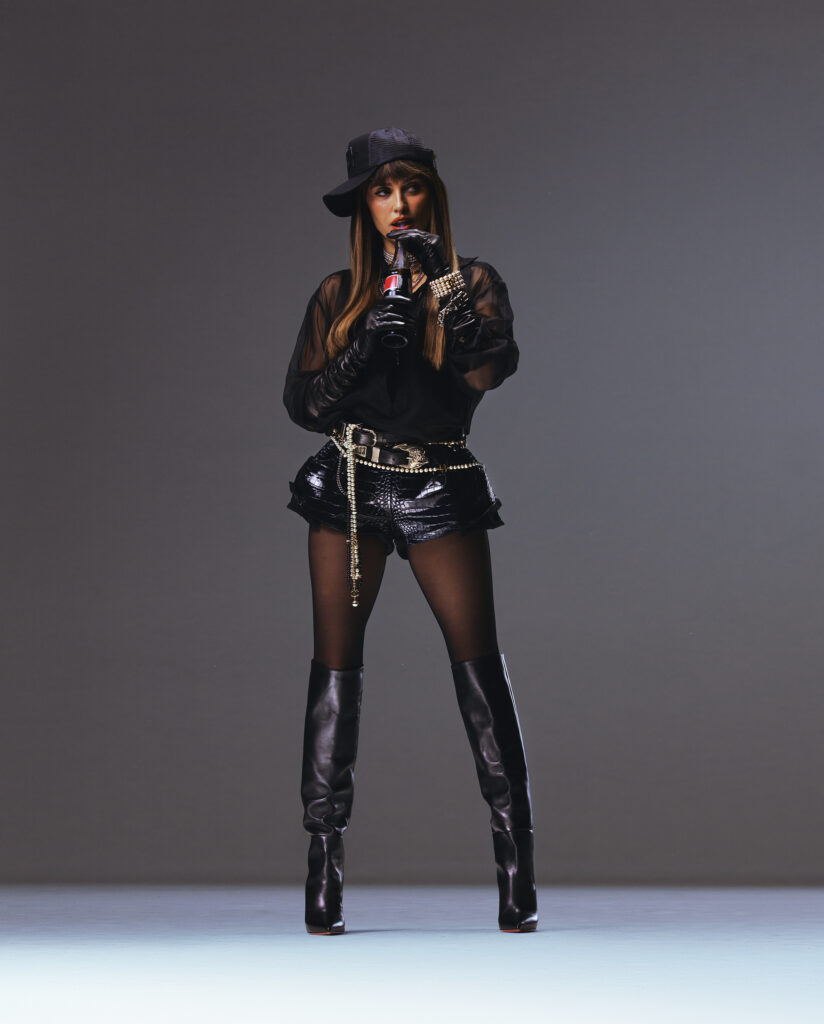
PC: Exactly. I realized later that it doesn’t make my work better and it doesn’t make my life better. Even if I say I’m not gonna take the character home, a part of it will come home with me. But now, maybe it’s 50% or 60%. It’s not the other torture that ends up forcing that energy. At the end of the day, the audience can feel when you are forcing that or just being a masochist because you think that that is going to have a better result. I don’t believe in that anymore.
In Parallel Mothers, there was a scene where I have to confess that the daughter is not mine. When we wrapped, I had to stay there hugging Pedro crying for an hour and a half. I could not function if I didn’t have that time after. He would hold me like a baby and I was crying and crying and crying on the floor, to the point where he was getting worried. But I needed that time at the end of the day to go back to myself, because I really didn’t want to take that home for my children. There is a time for transition and that is very important.
DL: I mean the role in Parallel Mothers is also so deeply emotional and difficult.
PC: When I read that script, I couldn’t believe it. It was such a treasure to have in my hands. But then every day was so terrifying.
DL: I can’t imagine. I can’t imagine the intensity. Are there any other roles in your career that you treasure or that you feel have taught you a really valuable lesson?
PC: I feel like when I pick one or two, I’m betraying all of the others. Even movies that maybe nobody has seen or movies that didn’t have good reviews or good box office, I feel like all of them are like little children because they’re all part of a process. But there are special ones for me because of what they meant.
For example, Volver (2006). I’ve done seven movies with Pedro but what he and I went through together in Volver—because we were in the area where he grew up—makes it very special. Or an Italian movie called Don’t Move from Sergio Castellitto that not a lot of people have seen. The trip that I went through, as a creative process, with that director—[who] was also the [lead] actor—is one that I will think about when I’m old one day. It had such a strong mark on me. Or my first movies because they were the first. And I will never forget the feeling of, ‘Oh, this is where I belong. This is where I’m happy.’ And the sadness on the last day of my first film, feeling like, ‘What if this is it? What if I’ve just been lucky and I do these first two projects, and it’s over?’ And I could not handle the thought. You know when you feel like you have found what you want to do for the rest of your life?
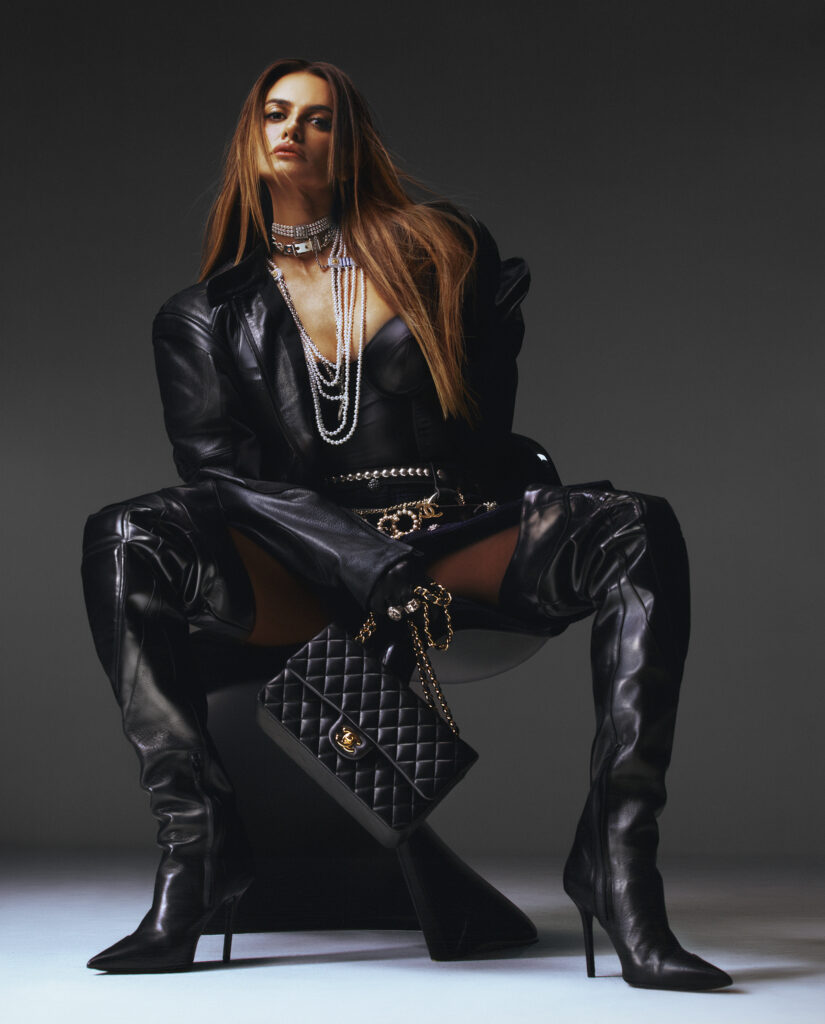
DL: When did that feeling change? Does that fear ever go away?
PC: No, and I love that. Every time I start a new project, I feel so lost and like a fish out of water in terms of finding the character and in terms of finding [my] place in the middle of the whole team. I always have so many fears at the beginning and I never want to lose them. I’m excited and happy that I have very similar fears now preparing for my new film.
DL: I think the feeling of the unknown and the excitement and the butterflies and everything that comes with it is so scary. But as long as I have those feelings, I’m in the right place. As long as I feel like I’m dangling over the edge just a little bit, then I’m doing what I’m supposed to be doing.
PC: I agree. I feel like everything that is related to art, we need to have that fear. You can never be too safe, [because] we will never get to a place where we have things under control. That doesn’t exist, it will not happen. That’s why maybe one can be 90 or 100 one day and have the same passion for this and the same insecurity.
DL: That’s something that I remember speaking to Pedro about. He was telling me how he never stops writing. Even if he just puts it in his desk for something to come up 5 or 10 years later, he’s always writing, always creating something because he’s just like, ‘I don’t want to stop.’ I think it’s amazing to see someone who’s so acclaimed and such a legend in his craft, to see that he also has this fear of, ‘What’s the next thing I’m going to do? And how am I gonna get to it?’
PC: If you see him on the set the first week [of filming], it is like the end of the world. His face of drama, like it is a life or death situation. He doesn’t sleep for the first week. It’s very hardcore, but I really respect that.
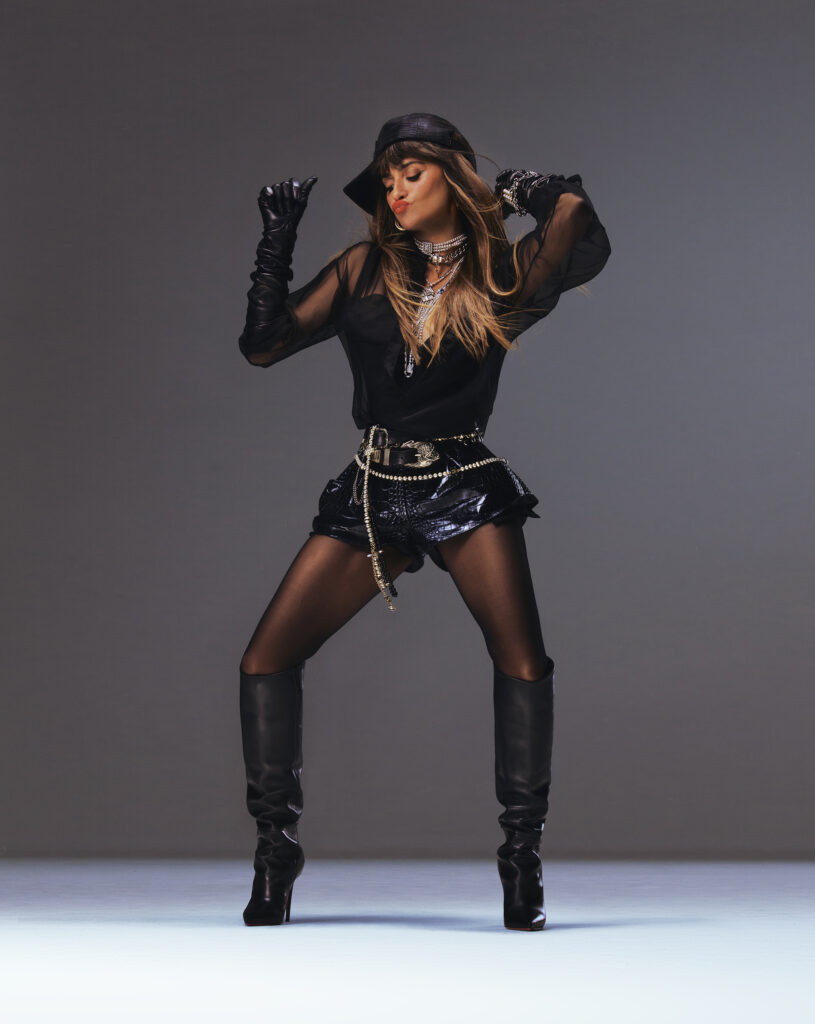
DL: Yeah, yeah. It’s amazing to see and hear you talk about how it affects you. Because when I see you, I’m like, ‘Oh, she’s got everything under control.’
PC: That’s how I feel about you. I have nothing under control. If you have children one day, you will see what it is realizing that you have no control over anything. Because the fear gets so much bigger.
DL: I’d love to talk to you a little bit about music. And if music is connected in any way to the roles when you’re developing a character. For me, visual storytelling plays such a big role in my music. Whether it’s mood boards, different images, colors, or things that helped me develop a song, video, visual, or a live performance. I’m wondering if the same happens for you with the roles you choose.
PC: Yeah, in a huge way—by the way, Pedro was so impressed about how much you know about cinema. He was like, ‘Wow, she knows everything!’ For me, music is actually the most powerful art. Even before film. When I was four, I started to do classical ballet and, through that, I was acting. I didn’t know, but I was releasing that necessity of trying to understand other people’s point of view through ballet. I was asking the teacher to give me the role of Carmen when I was four. They were like, ‘You have a few years to wait for that.’
DL: It’s a bold character choice for a four-year-old.
PC: I was like, ‘I understand this story. I want to be the lead!’ I’d go home and I would sit by the vinilo (record player). My [parents] had a collection of classical music, a lot of Spanish music, and a lot of classical opera. I have these memories of being 5 years old, spending hours sitting with huge headphones listening to Prokofiev and Tchaikovsky and Beethoven, dreaming. Like it was a drug. I would put them on and I would just fly away. I always use it for my work, to prepare for a scene, to be in the right state, in the right frequency. Music is the thing that will get me there faster.
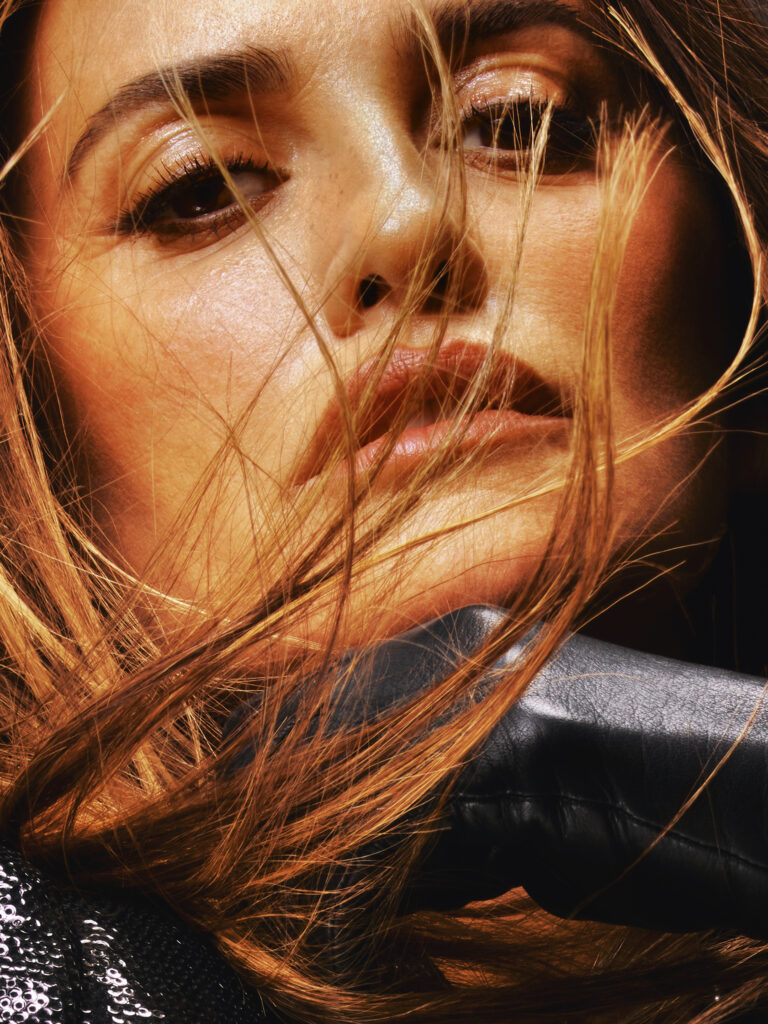
DL: Was there a specific artist or song that helped you during your character development of Laura Ferrari?
PC: For Ferrari, it was a lot of opera. Because of the relationship that she had with the opera. She could hear [it] from her living room—and this was all true—because this space where [she] lived, the opera was out there in the square. She wouldn’t go because she was too depressed. And she would hear the opera from the window, knowing that [Enzo] will be there with another woman.
DL: The freedom to be something else, that’s the beautiful thing about diving into a character. I think it’s amazing.
PC: Do you get nervous at award shows when you present or do a speech?
DL: Terrified.
PC: Me too. People ask me how that’s possible, but I usually have my characters to protect me in a situation like that. I’m just a vehicle for them. When I’m myself, I don’t know what to do.
DL: When I get up on stage, the moments before, I am so scared. And then it’s almost like I’m a different character. I’m invincible. I feel more strong and confident. I feel good. It’s just getting up on stage or before the performance. Those feelings are like the most scary feelings ever, you know? Okay, so as we’re doing an interview for V Magazine, we can’t not mention the cover story that you shot with Jack Bridgland. There was a lot of inspiration from the ‘90s, black leather and high boots. What did you love the most about this shoot?
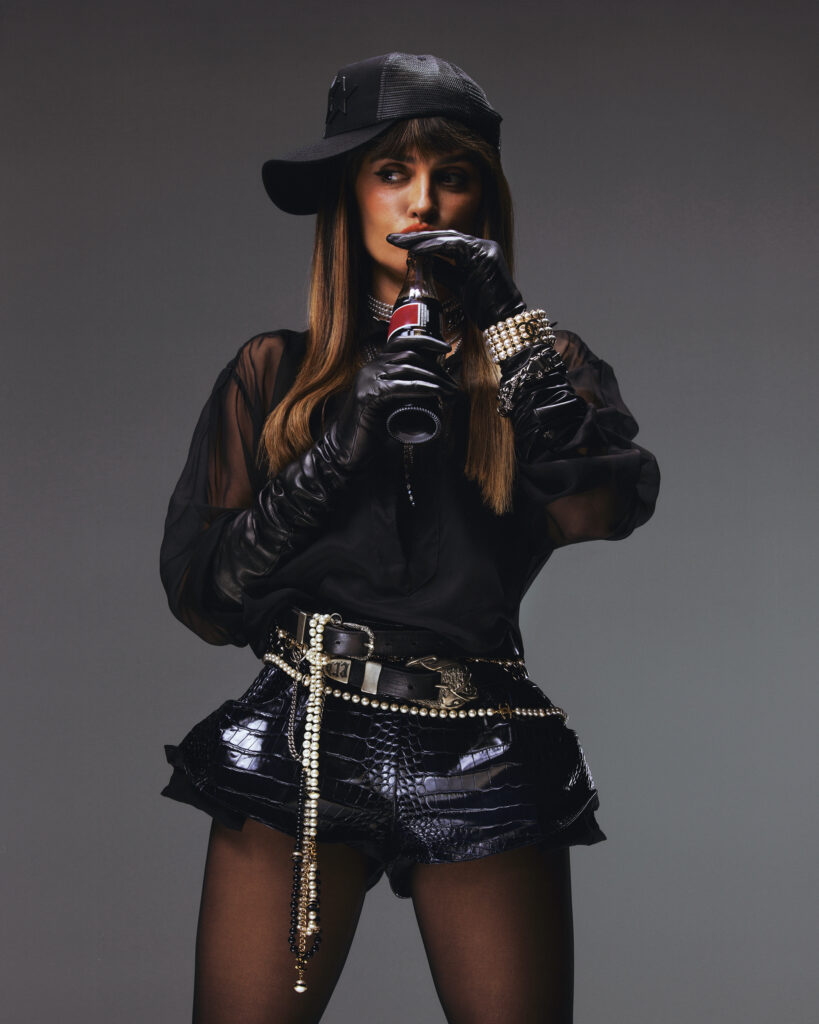
PC: I feel like I am kind of stuck in the ‘90s and also the end of the ‘80s in terms of aesthetics. In the ‘90s, there was very good equilibrium in [our] relationship with technology. Like everything before smartphones, everything before social media, I am convinced that all of this is not worth it. I don’t feel that our brains are prepared for that, especially teenagers or children. It’s such a crazy experiment that society is running on the youngest people and it breaks my heart. So I think it makes me feel even more in love with the ‘90s. For many reasons, I miss those times, but I also like the style of the photos. I totally trust Jack [Bridgland]. We’ve never worked together. But I think he’s such a brilliant talent. I felt so relaxed trying on all the looks. If I could, I would be dressed like that every day. I love the pictures. They are really cool and kind of nostalgic for me in that way. I feel like all of that is coming back.
DL: I’m all about the nostalgia. Everything that was cool before is coming back. So, shifting gears, me and you actually met last year as co-hosts for the Met Gala. Which was, for me, a highlight. Obviously, I loved hosting the Met Gala, but you were my highlight. Like running around together. It was just very fun.
PC: Seeing all the exhibitions barefoot and I had to hold your hand, because I had a cramp on my foot. I remember we were welcoming people up and I was asking Roger Federer, ‘You have to have a solution for this. I cannot stand still because I have this cramp.’ And I thought he was gonna tell me, ‘Oh, no problem, my official therapist is here.’ But he told me, ‘No, no, no. Just mental strength.’ I was like, are you kidding me? That was the tip he gave me.
DL: I think everyone was amazing. It was just a fun night overall. We were both dressed in Chanel, you had this beautiful white dress, which was recreated from what year?
PC: It was ‘86.
DL: You’ve been a longtime Chanel ambassador. What do you love the most about wearing Chanel?
PC: I’m obsessed. Since I was a little girl, I would study all the collections from Coco to Karl. When I saw your dress, I knew where it was from. I knew that Stephanie Seymour had worn it. I met Claudia Schiffer when she was wearing it at an event. I knew everything about that dress, it was one of my favorite dresses ever from Chanel. And on you it was incredible. Now, I think Virginie is doing an amazing job. She spent 25 or 30 years with [Karl]. I could not be more proud of her. Every time they send me something or a sketch or I see the new collection and I’m able to wear those things, I feel like a little girl.
DL: It feels like a very natural collaboration. Of course, we had a rave after the Met Gala.
PC: I went to yours, but I went too early and you were not there yet. I was like, ‘Okay, bye.’ I was so jet lagged, I could not.
DL: It lasted until like 4am. I was like, ‘Oh my god, I’m so tired.’ Because we were there since 5pm.
PC: It was so much fun. I think I’m gonna go again this year.
DL: Yeah? I think I’m gonna go too, I’m not sure yet.
PC: Come, please!
DL: I want you to be my date, so let’s just go together.
PC: Yes, let’s go together.
This cover story appears inside the pages of V147: now available for purchase!
Photography Jack Bridgland
Interview Dua Lipa
Fashion Gro Curtis
Creative Direction / Editor-in-Chief Stephen Gan
Makeup Mary Phillips (Mane Addicts)
Hair Pablo Iglesias (Nuria Saenz)
Set design Evan Jourden
Executive producer Dana Brockman (viewFinders)
Producer Frank DeCaro (viewFinders)
Digital technician DJ Dohar
Lighting director Ryan Hackett
Photo assistants Ricky Steel, Adam Matijasevic
Stylist assistant Carson Stannard, Eliott Soriano, Juliannah Schram
Set design assistant Nikolai Berrones, Daviel Shy
Production assistant Justice Beverley
Retouching Christina Martinez (Picturehouse)
Location Milk Studios
Discover More











